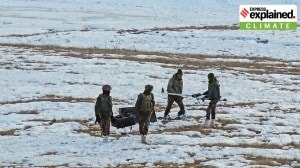The soldier8217;s apprentice
The destination was a village called Sumwali, one kilometre from the Line of Control in Kashmir. The mission was to hear the people of th...

The destination was a village called Sumwali, one kilometre from the Line of Control in Kashmir. The mission was to hear the people of this village tell the story of life on two sides of the border. Before that there was the daunting task of getting there. There are no roads leading to this village and the only way to get there is on your own two feet.
But first, a little about why anybody would want to embark on a two-hour trek to the village. Sumwali is an interesting place from a reporter8217;s point of view, with all the trappings of a great story. It is inaccessible, a stone8217;s throw from the Indo-Pak border and a village where loyalties have changed twice over. At the peak of militancy in the Valley, villagers thought the grass was greener across the border. Seeking a better life, the entire village migrated to the Pakistani side. Two years in their new homes and things did not look too bright. Life was tough, the money meager and 8220;it was just not home8221;. So they picked up their bags and came rightback.
Back to the journey. The vehicles were parked at base camp, shoe laces tightened and the trek began. The first 15 minutes were fine. The majestic mountains, the gurgling stream and the wild flowers were a pretty sight. For the next 15 minutes, the scenery aside, I became conscious of my heavy breathing and the little trickle of sweat down my forehead. At this point I looked back and realised that we hadn8217;t really covered a lot of distance.
We were moving up in small groups. Walking ahead of me was Havaldar Surender Pal of 10 Sikh LI, the unit patrolling the border in this area. He kept a brisk pace and I tried very hard to keep up. Walking alongside were pony Basanti and her owner Shafiq.
One hour into the trek and things were not looking good. My heavy breathing had become heavier, sweat was no longer trickling down, it was pouring down 8212; and my face was a deep shade of red. It was at this point that I also realised that my toes were hurting.
Stopping for a breather, I looked ahead and saw thetrack snaking up. I also saw Singh looking at me, a smile on his face. 8220;The climb will soon be over and then it is all downhill,8221; he told me. In reply I told him that I was from Delhi. He nodded understandingly.
Up the hill and down the hill we went for another half an hour. Now, not only was sweat pouring out through every pore in my body, my face had salt deposits. It was disgusting. Wiping it didn8217;t help because it reappeared in a jiffy. And to make matters worse, at the next climb my feet refused to move. I clung on to a branch and was contemplating mounting Basanti when Singh smiled again. 8220;It8217;s just half an hour more and most of it is downhill,8221; he said. I sighed and we continued walking.
I had stopped paying attention to the breathtaking scenery quite a while back. I was huffing and puffing my way to Sumwali, trying hard not to think of my aching feet. All this while Singh had been dancing down the track. He hopped, skipped, jumped all the way, inspiring me to soldier on.
I made it to thevillage, saw the villagers walk in and out of the new community centre that the Army had set up for them. The older women were particularly excited about the television set in a corner of the library, the children with the board games. I got the story, discussed it and now it is there somewhere in one of my note pads. But the walk, well that is something I still remember, minute by painful minute.
Now, replace my two-hour-plus walk with five hours, the gradual ascent with a steep uphill mountain climb recalling the pictures from Kargil will help here and my handbag with a heavy backpack. Also, my once-in-a-lifetime experience with everyday routine. What you will be looking at will be the life of an infantryman of the Indian Army.
And after my walk with the infantry I realised that Singh and every other foot soldier patrolling our terrain round the clock is not just doing his job. And everybody who disagrees should just take a hike.
- 01
- 02
- 03
- 04
- 05































